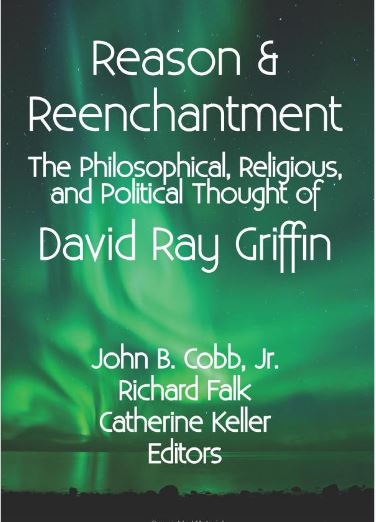 Reason and Reenchantment: The Philosophical, Religious, & Political Thought of David Ray Griffin
Reason and Reenchantment: The Philosophical, Religious, & Political Thought of David Ray Griffin
Reviewed by David Lorimer
David Ray Griffin is Professor of Philosophy of Religion and Theology, Emeritus, at Claremont School of Theology and Claremont Graduate University where he is still co-director of the Center for Process Studies. He is the author or editor of 35 books in theology, philosophy, philosophy of religion, the relation between science and religion, and social, ecological and political issues. This book on his philosophical, religious and political thought is the outcome of a seminar held to mark his ‘retirement’. There are fourteen essays covering the full range of his interests, followed by 60 pages of Griffin’s responses and an account of his intellectual journey. This last chapter is a good place to start as he outlines the major influences, including Paul Tillich and that of one of the editors, John Cobb. He heard a lecture by Aldous Huxley, and was captivated by Cobb’s seminar on Whitehead’s philosophy and its religious relevance. In Germany, he heard Pannenberg expounding his theology then, back in Claremont, he deepened his acquaintance with Whitehead. In the meantime, he had also acquainted oneself with philosophy of mind and parapsychology. He was also formulating his thoughts on global democracy and global ethics, on naturalism and religious pluralism, and, more recently, on imperialism and the inadequacy of official accounts of 9/11.
For those who are not familiar with him, A.N. Whitehead (1861-1947) was a mathematician and philosopher who taught Bertrand Russell and later collaborated with him on Principia Mathematica. He was an expert in the history and philosophy of science and went on to teach at Harvard from 1920s on. His major work is his Gifford Lectures published as Process and Reality, and which I read during the summer of 1983. Whitehead invents his own terminology and, while he has had considerable influence in many fields, his work is less well-known in mainstream British philosophy. Once one has really taken on board what Whitehead has to say, one cannot continue to do philosophy as before. In this book, he is quoted as saying, ‘it belongs to the self-respect of intellect to pursue every tangle of thought to its final unravelment.’ Sandra Lubarsky is right in saying that this approach typifies David Griffin as he is not prepared to take things at face value without thinking them through for himself from first principles.
Moreover, he has done much of his work in unpopular and unfashionable areas. Whitehead himself was not directly interested in parapsychology and, as John Cobb observes, it is a generally unacceptable topic in the University. Hence most Whiteheadians ignore it in the same way as theologians and philosophers in general. Theologians tend to be embarrassed by strong affirmation of evidence for life after death rather than seeing it as confirmation of their theological views. For Griffin, as John Cobb remarks, the truth of the statement is more important than its acceptability in one community or another. It leads him to regard life as a real spiritual adventure.
Griffin has elaborated a number of new terms such as panexperientialism, constructive postmodernism and non-supernatural naturalism. These make important distinctions and contribute to a refinement of thought. He prefers panexperientialism to the more popular panpsychism by asserting that experience is fundamental as a basis for consciousness and freedom that is denied by the prevailing scientific picture. His view is naturalistic without being materialistic, and Griffin is very careful to define various forms of naturalism so as to situate his view within a non-dualistic worldview. He proposes a ‘non-dualistic, neoanimistic, panexperientialist philosophy, in which experience and spontaneity are fully natural features of the world, characteristic of nature at every level.’ Parapsychology becomes a real possibility in such a view, as does life after death, on which Griffin has written at length. However, he cannot accept the evidence for precognition at face value as he regards it as a contradiction in terms. He upholds the causal efficacy of minds against epiphenomenal views, and exposes the limitations of materialistic philosophical premises. His constructive post-modernism has exerted considerable influence in China, as one of the essays shows.
Griffin’s courage has more recently been in evidence with his forensic analysis of the inadequacies of official accounts of 9/11. His initial interest was American imperialism whereby America claims to be a good empire. This claim disintegrates when one reads the series of 10 books that he has written on this topic and it becomes clear that the Iraq war was justified by 9/11 as a false flag operation.
The initial book, The New Pearl Harbour, summarises the main arguments against the official theory and was available to the authors of the 9/11 Commission Report, which did not provide a rebuttal of his arguments, preferring mainly to ignore them. Needless to say, it was difficult to find a publisher for this first book, but it sold more than 100,000 copies. I have reviewed all these books in previous issues of Network Reviews. Tod Fletcher provides an excellent summary. Griffin himself underscores the relevance of 9/11 as a theological issue in the tradition of Old Testament prophets denouncing corruption and injustice.
Since the book was published, Griffin has taken on an entirely new field with his authoritative study of global warming, Unprecedented, which I reviewed in the last issue. Again, it is typical that he looks at the evidence from all angles and comes to his own conclusion. He is an exemplar of integrity and moral courage whose work deserves to be better known, and there is no better introduction than this volume.
